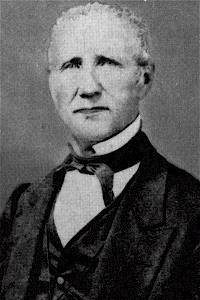William Walker, A.S.H.
(From the The History of Spartanburg County, (J.B.O. Landrum), 1901
Professor William Walker, A. S. H., was born in Union county, S. C, May 6th, 1809, on Tyger River and near the village of Cross Keys in the same county. He was of Welsh descent, his father emigrating from Wales in the eighteenth century. His mother was a Miss Jackson, granddaughter of Ralph Jackson, Esq., who was elected by the State Legislature a justice of the quorum in Union district, S. C, only a few years after the close of the Revolution. It is said that she was a relative of General Stonewall Jackson, with whom Mr. Walker during the civil war became quite familiar. During his service as hospital nurse he visited the general quite frequently, from whom he learned his mother’s kinship to the illustrious general.
When about eighteen years of age the parents of Mr. Walker, who were in straitened circumstances, migrated to Spartanburg district and settled in the neighborhood of Cedar Spring. The scholastic education of the son, the subject of this sketch, was of an elementary kind. He made good use of the advantages afforded him and in course of time “gratified a large ambition which he had worthily imbibed to advance the psalmody of his church. He joined the Baptist Church at a very early age, and amid the ebullitions of his early Christian piety and religious fervor he conceived the idea ‘Praise the Lord’ on “stringed instruments, ‘the ‘psaltery and harp,’as well as with the human voice, were not only requisites, but grand concomitants of religious worship.
“To perfect the vocal modes of praise became the leading ambition of his long, laborious and useful life. Determined, at once he resorted to pen and paper. The deep minstrels of his own bosom he gathered and arranged into meter and melody a wonderful book suitably adapted to the praise and glory of God.”
He soon published a musical work entitled “The Southern Harmony.” This popular book comprised the shaped notes or that peculiar style of musical notation which contradistinguishes the same from the more current literature of the present age.
Notwithstanding some depreciation by the press he adhered to his original system, and his reputation for attainments in his science soon spread all through the South and Southwest. “Everywhere his popularity as a music teacher went and his work received a most popular indorsement.”
To distinguish him from others of the same name he was known as Wm. Walker, A. S. H, (author Southern Harmony ).
Says a writer in The Musical Million: “Scarcely a hamlet, scarcely a church in the wooded coverts of those several sections, have not been made to reverberate the praises of God in accordance with the metrical spirit of that system he originated. ‘The Southern Harmony’ and his name, the name of the distinguished author, are as familiar as household duties in the habitations of the South.”
Mr. Walker, not content with his first publication, determined to prepare and publish a more elaborate and thoroughly revised musical work, which he did under the title of the “Christian Harmony.”
This book “has met with a like popular currency, and the two conjointly have given him a most enviable reputation as author, vocalist and teacher. Everywhere within the limitations of the South and West he organized ‘singing schools,’ as they were popularly denominated, and in each prepared, qualified and commissioned in persona many of the brightest of his pupils as instructors in the department of music.”
He was author and copublisher with the Miller Publishing House of Philadelphia, Pa., in publishing his musical works, and realized a large sum from the sale of his books throughout the country.
Mr. Walker was devoted to the service of a religious and pious life from early youth, and steadfastly held to it during his sojourn here on earth. His faith in his great Redeemer was of an intensely strong and abiding nature, and no misfortunes in life, of which he had many, ever caused him to despair or falter in the course he had chosen to guide him through the vicissitudes of life. He possessed in an eminent degree a happy disposition, an elastic feeling that all would be well in the end, and would never suffer his buoyancy of mind and heart to yield to any gloomy foreboding whatever might befall him. He quoted his great Psalmist: “That the righteous would never be forsaken nor his seed begging bread.’’ He was possessed of a mind of a literary turn, and had a large and valuable library, and having been engaged for some years in the introduction and sale of books in the town of Spartanburg, he became possessed of many rare and valuable books of general interest.
He was a man of quite liberal views, and was ever ready with his means and influence to advance the cause of any enterprise which seemed to be a public benefit.
At the age of about twenty-four years Mr. Walker married Miss Amy Golightly and settled near Spartanburg. “His marriage was a happy one, their tastes being congenial and their dispositions naturally equable and uniform”.
“By this marriage ten children were born, five sons and five daughters, nine of whom survived him. Four sons are still living, (in 1901) Joseph D. Walker living in Arkansas, Absalom and Miles T. Walker residing in Texas, the latter being a Baptist minister. Franklin B. Walker, the youngest son, is a resident of Elberton, Ga. The daughters are Mrs. J. B. Davis, of Greenville, S. C. ; Mrs. Emma Logan, of Forest City, N. C, and Mrs. Lou Lynch and Mrs. Flora Justice, of Rutherfordton, N. C. Miss Mary Walker, his third daughter, died in Spartanburg some years after the death of her father, which took place September 24th, 1875. . . .
“It is said Mr. Walker died, as it were, “ with melodies on his tongue for the goodness and tender mercies of God.”*
* That part of the foregoing sketch of Mr. Walker, A.S.H., under quotation marks is extracted from a beautiful tribute to his memory by Judge T. O. P. Vernon, which was published in the “ Musical Million,” Singing Glen, Virginia, January, 1876.



